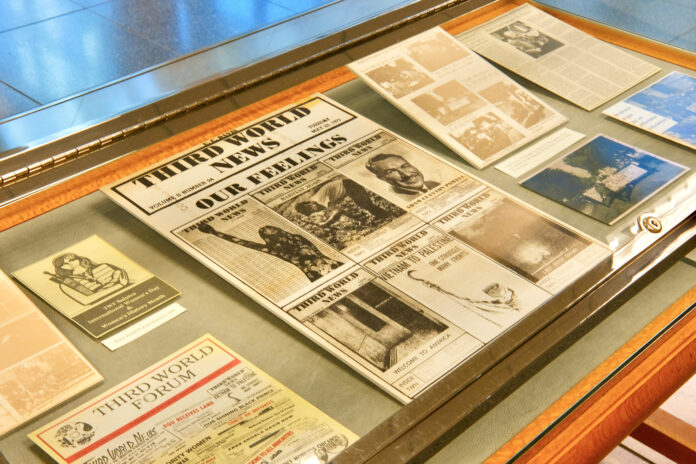The exhibit highlights the UC Davis student newspaper, Third World Forum, which marginalized students of color created to bring attention to social justice issues
By MADISON PETERS — campus@theaggie.org
From Jan. 12 through April 22, Shields Library is showcasing the “By Any Means Necessary: Marginalized Students Give Voice in the ‘Third World Forum’” exhibit. Located in the library lobby in front of the Archives and Special Collections, this exhibit displays archives from the Third World Forum, a student newspaper run from 1970 to 2013 that was dedicated to giving students of color a voice.
According to Christine Cheng, instruction and outreach librarian for archives and special collections, the newspaper was created in response to marginalized students not feeling represented by the official school newspaper, The California Aggie. The Third World Forum covered topics ranging from protests on campus to global social justice issues.
One excerpt from the Third World Forum explains the goals of the publication.
“[The ‘Third World Forum’ serves as] a bridge between the communities that have been historically oppressed and the students of color, [and] providing those students who are far away from their communities with information on what is happening within those communities,” the excerpt read.
The exhibit took around two months to put together, and Cheng said that she created it so that undergraduate students would find something meaningful when they came into the library.
“I wanted to find something that would interest [undergraduate students]; something that they could see themselves in [and] that they cared about,” Cheng said. “I can feature all the Shakespeare and literary figures that are important, but when they come into the library, do they feel welcome? While Shakespeare is still important, there are certain social justice issues that were important then and continue to be significant today.”
The exhibit is composed of six cases, which all display excerpts of news articles, front pages and centerspreads from the Third World Forum. According to Cheng, the first case introduces the newspaper and contains words from the editors of the publication describing the publication itself and its significance. The subsequent cases contain articles that celebrate important cultural events and occurrences dedicated to the groups of Native Americans, Asian Americans and Pacific Islanders, Latinxs and Chicanxs and Black Americans.
Many of the articles feature photographs taken by Francisco Dominguez, who worked first as the cultural desk editor of the Third World Forum and later transitioned into the role of photographer for the publication.
According to Dominguez, the publication got its name from the Third World Liberation Front strikes that occurred in 1968 at San Francisco State University and the University of California, Berkeley which called for many demands, including the inclusion of ethnic studies as a part of the curriculum.
“Student empowerment is what I was documenting,” Dominguez said. “It was students of color empowering themselves on campus, and making their own events and protesting if there was something racist that happened. They would speak up. It was all about building a community for the students of color to have a voice and it worked.”
During his time at the Third World Forum, Dominguez interviewed and worked with many prominent figures such as John Trudel, Martin Luther King Jr’s son, Jack Forbes and Caesar Chavez.
According to Dominguez, the publication faced great backlash from many groups on campus, and was constantly threatened by funding. Dominguez said there was even an anonymous newspaper, the Davis Republic, being released with the sole purpose of ending the “Third World Forum.”
“We were always under attack from funding or political attack from conservative forces on campus because some people didn’t like what we had to say,” Dominguez said.
The newspaper eventually got defunded after it was put to a student vote by ASUCD in 2013.
Anyone can visit the exhibition that is displayed in glass cases on the first floor of the library during normal Shields Library hours found on their website, according to Cheng. If anyone wishes to explore more hard copies of the publication they can stop by the Archives and Special Collections department which is open Monday through Friday 10 a.m. to 12 p.m. and 1 p.m. to 3 p.m.
If people are unable to visit the exhibit in person, Cheng said they can see the digitized archives of the Third World Forum on the California Digital Newspaper Collection website.
Cheng hopes students will not only come see the exhibit, but also explore the other resources that are found in the Archives and Special Collections. Additionally, Cheng indicated her plans to eventually create a “Third World Forum” digital exhibit, so that everyone can continue to explore meaningful topics the paper addressed.
Dominguez shared these sentiments and commented on the overall impact that the paper had.
“It was all about student empowerment, reclaiming our history and telling our own story,” Dominguez said. “That’s a part of what happened in the 60s and 70s when people of color took control of their own destiny, which was then called self determination. That’s what we were doing.”
Written by: Madison Peters — campus@theaggie.org










